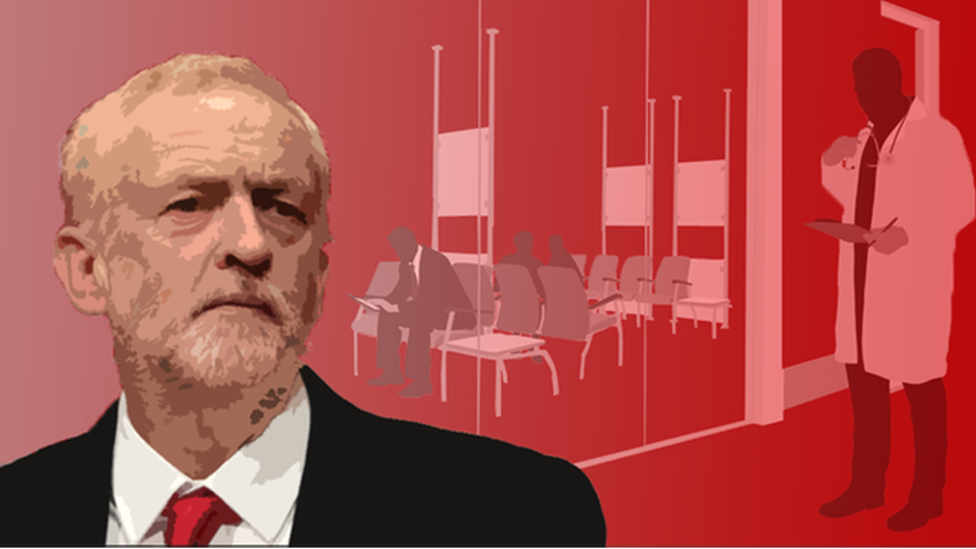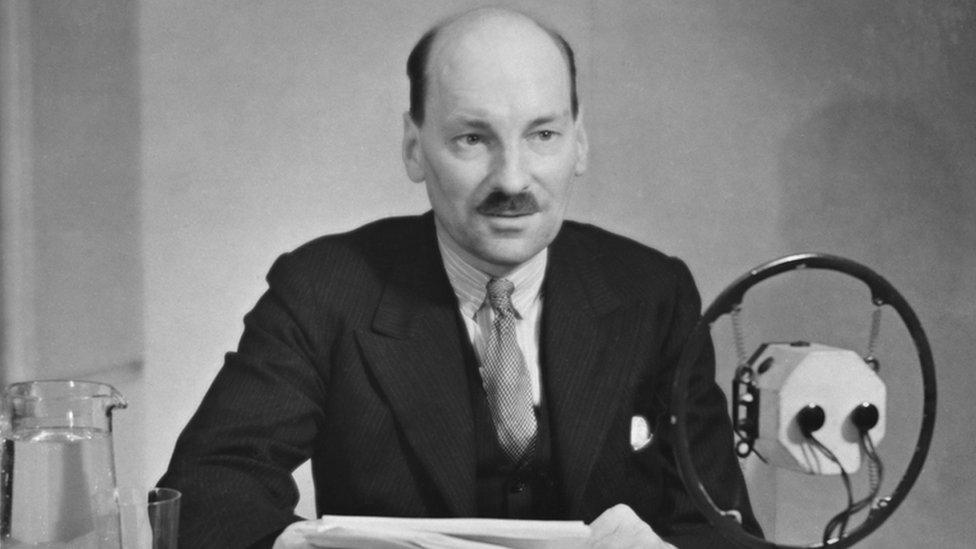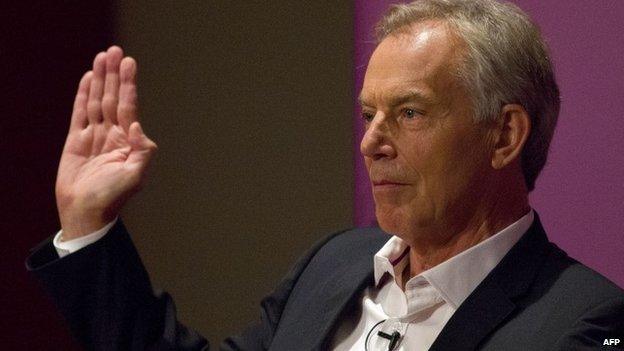Guide to the parties: Labour
- Published

The Labour Party is seeking to return to office after seven years out of power under new leader Jeremy Corbyn, who has breathed new life into the party's grassroots but lacks the support of many of his MPs.
Potted history:
Set up in the late 19th Century to represent workers as the political wing of the trade union movement, to give working people a voice in Parliament.
First came to power in the 1920s, but only achieved a decisive working majority when Clement Attlee unexpectedly beat Sir Winston Churchill in the immediate aftermath of World War Two.

Clement Attlee led the agenda-setting 1945 Labour administration
Returned to power in the 1960s and 1970s under Harold Wilson, but industrial strife and 1979's Winter of Discontent ushered in a period of 18 years in opposition.
Tony Blair took office with a landslide in 1997, and went on to win three elections, campaigning as New Labour, and embracing some of his Tory predecessor Margaret Thatcher's free market policies.
Where are they now?
The second biggest party at Westminster with 229 seats, after a 2015 election campaign led by Ed Miliband, which fell short of expectations.
As of March, the Labour Party had about 517,000 members - up from 189,500 in December 2013.
Key players:
Jeremy Corbyn and John McDonnell. Labour strategists believe the election campaign will give voters a chance to see Mr Corbyn in a different light, a decent man who is passionate about social justice, rather than the caricature of him in the right wing press as an out-of-touch left wing ideologue.
Mr McDonnell is also being pushed to the front of the campaign, talking about his working class roots and his plans for the economy.
The Conservatives have also put Mr Corbyn at the centre of their campaign, constantly claiming that he would be a "shambolic" and "chaotic" leader not up to the job of PM. Theresa May has, nevertheless, ruled out going head-to-head with him in a TV debate.
Some "moderate" Labour MPs fear their leader has little in common with the party's traditional supporters, or the broader electorate.
"A thumping victory - the unexpected candidate is now Labour's accidental leader", reports Laura Kuenssberg
Mr Corbyn admits he faces a challenge on an "historic scale" to win the election but he says he has defied the odds before, wining the Labour leadership with a landslide, when no one gave him a prayer, and repeating the feat when challenged a year later.
This will be third time in as many years he has hit the campaign trail and he has been getting a rapturous reception from supporters.
Leader's philosophy in a quote:
"We don't have to be unequal, it doesn't have to be unfair, poverty doesn't have to be inevitable."
What the critics say:
"Corbyn and McDonnell seem to be competing to see who can make Labour more unelectable," Tom Brake, Liberal Democrats
What do they hope to achieve?
Jeremy Corbyn and the Labour leadership will be going all out for a decisive win.

Former leader Tony Blair warned against electing Corbyn as leader
In the wake of a poor performance in the local elections, which saw Labour voters in many parts of the country switching to the Tories and Labour failing to regain ground in Scotland, some fear the party is headed for its biggest defeat since 1983.
Their aim at the very least will be to prevent a Tory landslide that they say would hand Theresa May a "blank cheque" to go for a "hard Brexit". They will also be hoping to get a greater share of the vote than the 30% achieved by Ed Miliband in 2015, which will enable Mr Corbyn to claim to internal critics he is making progress.
Strong suit?
The NHS. After all it was the Attlee government which set it up in 1948, and it remains widely seen as Labour's crowning achievement. The party will be keen to move the focus of the campaign away from Brexit, and on to domestic issues, such as the NHS, which has come under intense pressure in recent months.
Labour also believes it can score big with voters who feel the economic system is "rigged" against them, with one law for super rich tax avoiders and another for ordinary working people.
Where do they stand on Brexit?
The Labour Party campaigned against Brexit in the referendum but Jeremy Corbyn, who was a Eurosceptic as a backbencher, was criticised for a low-key performance. Many said his heart wasn't really in it.
The party now says that the result must be honoured, provided workers' rights, access to the benefits of the single market and four other tests are met.
The vast majority of Labour MPs backed Remain ahead of the referendum, leaving those who represent Brexit-voting constituencies potentially at odds with their electorate.
But most MPs followed party orders to allow Article 50 to be invoked in February's vote, and will hope that the party's acceptance of the result will help fend off attacks from other parties.
Five key policies:
No income tax rise for anybody earning less than £80,000 a year - but a tax rise for the top 5% of earners
£250bn to be pumped into the economy to finance a million new jobs
Renationalise the railways, Royal Mail and bring in state-owned energy companies
Strengthen trade union rights - including increased unionisation across the workforce and repealing last year's Trade Union Act